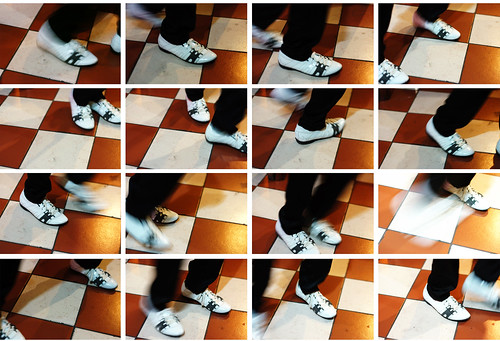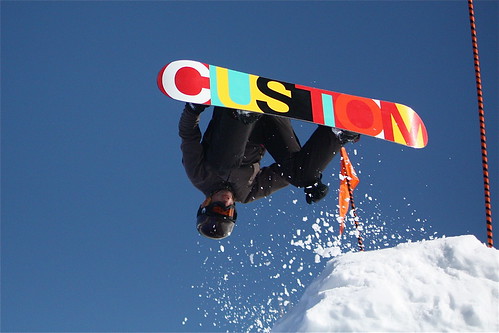Flip flops. You see a lot of them in Austin in the summer time. The perfect summer time footwear.
You also frequently see a different kind of "flip flop" in the world of politics, when legislators suddenly change their stance on an issue to fall in line, gain political leverage, or improve their likability. But these "flip flops" are no longer limited to politics. The world of sport is rampant with them now. Sadly, the "flip flop" appears to have become the norm these days.
With that in mind, episode 058 of the Rhubarb Report deals with just a few flip flops, fiascos, and some words from FDR.
 It still has me shaking my head in disbelief.
It still has me shaking my head in disbelief.
The article in question: "The Eight Best Physical Therapy Methods Explained". It first appeared on greatist.com and then, lo and behold, made an appearance on Huffington Post. An article on physical therapy? An attempt to summarize, for the mass populace, what we do in our profession? Consumer awareness and a little publicity?
That has to be a good thing. Or is it?
Ugh.
If that is what my profession brings to the health care table, then I am seriously disappointed and disheartened - not just for the consumer, but for the profession as a whole.
 There is a beauty in the spoken word. I have always been fascinated by the great orators and their power to inspire with the spoken word. A powerful speech is the ultimate monologue.
There is a beauty in the spoken word. I have always been fascinated by the great orators and their power to inspire with the spoken word. A powerful speech is the ultimate monologue.
The spoken word doesn’t have to be a solo experience though. The same can be said for thoughtful discussion between two willing and invested participants. Effective dialogue has a beauty to it as well. It can be intense, elegant, emotional, and exploratory.
Monologue is much like a solo dance. It might have the crowd in awe as the dancer spins and slides across the floor. But it is, by definition, a solo performance. Dialogue is the subtle interaction between dancers as they feed off of each other to create something special together.
When it comes to communication, have we become a world of soloists?
 It is a daily battle we all wage: the fight against gravity. In order to participate in life on the planet, we are subjected to mechanical loading – all day, every day. It never goes away, regardless of functional activity or sport technique.
It is a daily battle we all wage: the fight against gravity. In order to participate in life on the planet, we are subjected to mechanical loading – all day, every day. It never goes away, regardless of functional activity or sport technique.
Our ability to adapt to the demands of mechanical loading imposed upon us defines our capacity to function – or not.
Much attention has been given to the importance of “pain science” with many authors suggesting a move away from a traditional biomechanical model. But I can tell you one thing – as long as there is gravity, there will be a need to understand mechanical loading and embrace it as a systems approach, not a micromanagement model.
 My thought for today started with an insightful and thought-provoking blog post by Dr. John Childs regarding the APTA’s proposed new vision statement – and the discussion it inspired. In that discussion, there was a phrase mentioned that nicely summarizes one of the greatest problems facing Consumer Direct Access to Physical Therapy: “It’s all in the language”.
My thought for today started with an insightful and thought-provoking blog post by Dr. John Childs regarding the APTA’s proposed new vision statement – and the discussion it inspired. In that discussion, there was a phrase mentioned that nicely summarizes one of the greatest problems facing Consumer Direct Access to Physical Therapy: “It’s all in the language”.
The majority of states have what is termed “Restricted Direct Access”. If this isn’t an oxymoron – much like “jumbo shrimp” – I don’t know what is. No wonder that patients and clinicians, including the gatekeepers themselves, are confused.
The solution lies in the language itself.
 Welcome to 2013. The new year brings with it the refreshing sense of a clean slate. Tabula rasa. Raise a glass for the excitement ahead.
Welcome to 2013. The new year brings with it the refreshing sense of a clean slate. Tabula rasa. Raise a glass for the excitement ahead.
But then we are hit by the realization that January 1 looks a whole lot like December 31 – just add champagne and a ball dropping in Times Square.
Another year is upon us, and as always, yesterday’s rhubarb is tomorrow’s humor. An humor is always plentiful. Sometimes, the more things change, the more they stay the same. Here is Episode 57 of the Rhubarb Report.
 The year 2013 brings with it a brave new world of polarized politics in the United States. The country is more divided now than I can ever remember. Frankly, I find it progressively more annoying. The sensationalism of the media certainly doesn’t make the situation any better.
The year 2013 brings with it a brave new world of polarized politics in the United States. The country is more divided now than I can ever remember. Frankly, I find it progressively more annoying. The sensationalism of the media certainly doesn’t make the situation any better.
There are now seemingly countless issues that are becoming more and more polarized. Prime example: the fiscal cliff. Add to that health care reform. How about a side order of gun control, women’s rights, and immigration reform?
So here’s a thought. Let us move from the “Year of Polarized Diatribe” to the “Year of Legislative Accountability”. Be it local, state, or federal, it is time to take control over the issues at hand and demand accountability from our representatives. Either legislators stand up and face the music, or we fiddle and complain incessantly while Rome burns before our very eyes.
The problem starts with the current status of the US Congress, which appears to be increasingly disconnected from the American public.
 "Running Injuries: Etiology And Recovery- Based Treatment" (co-author Bridget Clark, PT) appears in the third edition and fourth editions of "Clinical Orthopaedic Rehabilitation: A Team Approach" by Charles Giangarra, MD and Robert C. Manske, PT.
"Running Injuries: Etiology And Recovery- Based Treatment" (co-author Bridget Clark, PT) appears in the third edition and fourth editions of "Clinical Orthopaedic Rehabilitation: A Team Approach" by Charles Giangarra, MD and Robert C. Manske, PT.
 Allan Besselink, PT, DPT, Ph.D., Dip.MDT has a unique voice in the world of sports, education, and health care. Read more about Allan here.
Allan Besselink, PT, DPT, Ph.D., Dip.MDT has a unique voice in the world of sports, education, and health care. Read more about Allan here.
 Top 5 finalist in three categories: "Best Overall Blog", "Best PT Blog" and "Best Advocacy Blog".
Top 5 finalist in three categories: "Best Overall Blog", "Best PT Blog" and "Best Advocacy Blog".